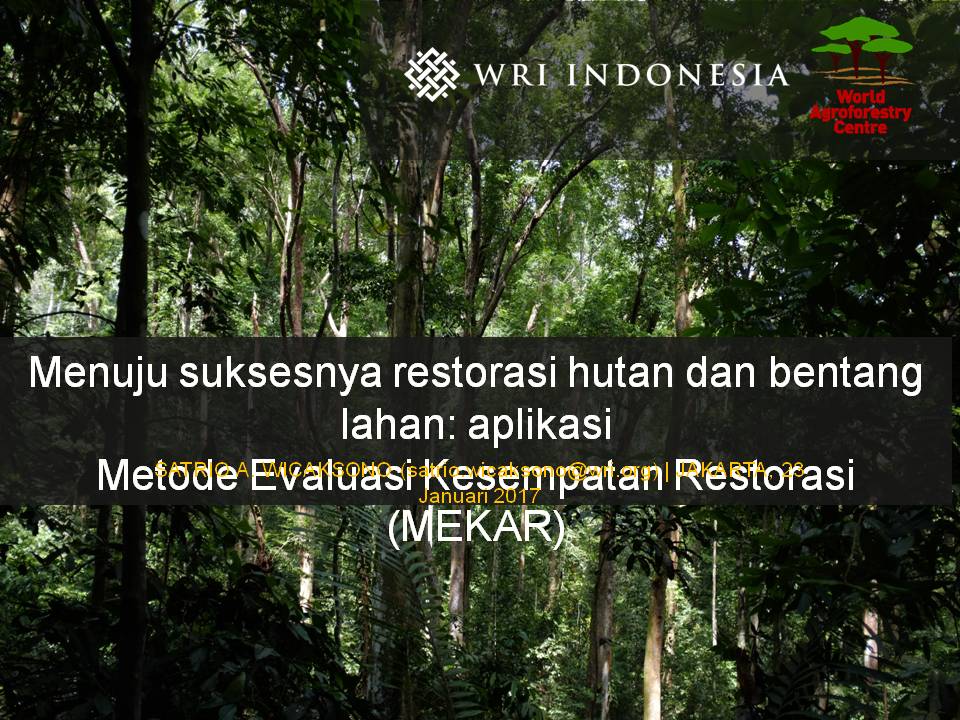Reported by Adinda Rizky Herdianti
On Monday 23rd January 2017, ANU Indonesia Project hosted an FKP seminar in which Satrio A. Wicaksono (World Resources Institute Indonesia or WRI Indonesia) gave a presentation on “Towards a Successful Forest and Landscape Restoration in Indonesia: The Application of Restoration Opportunities Assessment Methodology”.
Landscape restoration has an escalating importance to the world since pressures toward landscape have been intensifying globally along with the growing population worldwide that bring along heightening consumption and the decreasing landscape utilization rate with increasing rate of degradation and deforestation. Not only can forest and landscape restoration help degraded forest and agriculture have their functions and productivity restored but it can also heighten the ecological functions of the land thus hopefully improve the livelihood of the people around the area. Furthermore, restoration acts can be focused to achieve multiple benefits through putting into consideration various factors such as needs of the native, the local situations, and future changes. Forests and landscapes that have been marked as deforested or degraded have to be further specified so key strategies can be identified as there are plenty of restoration options with varying time and cost needed, and also varying results.
Restoration Opportunities Assessment Methodology (ROAM) is expected to be able to give relevant and analytical inputs to help form related policies in relation to landscape management and restoration. Furthermore ROAM could help complete related data like regional growths. ROAM here is based on research and development done in a few countries and is actually still in prototype stage thus further feedback is necessary to keep improving the program and it is actually are being used in Jambi and South Sumatera right now.
There are 6 main component to ROAM which are involvement of myriads of stakeholders, geospatial mapping, economical analysis, carbon analysis, enabling emission analysis, and financial analysis. Roam have 3 stage process where the first phase is planning and readiness, second phase is data gathering and analysis, and the last phase is results and recommendations.
These various phases can be further elaborated into a few points. The first phase, planning and readiness, includes defining problems and goals of the study, involving various stakeholders, defining output and limitation of the study, identifying plausible rehabilitation options, and identifying the range of restoration interventions. The second stage, data gathering and analysis, includes gathering available previous data, spatial analysis, economy analysis, carbon analysis, diagnosing key supporting factors, and financial and funding analysis. The last phase, results and recommendations, include results validations, recommendations, implementations, and local feedbacks.
Indonesia as a country already have a decent restoration target which is in line with the global target. Moreover, various restoration acts have been going since Orde Baru. However there are plenty of challenges in implementing landscape restorations in Indonesia and few of the key ones are the loose relationship between stakeholders, lack of initiatives to push for long-term restoration success, and financing the restoration attempts.
The goals and range of the restoration assessment is done through forum group discussions with the stakeholders. The discussion also include topics such as main problems in the regions, previous restoration attempts, why previous attempts failed, the restoration goals, budgeting and financing, and also the interventions criteria that are desired. It has been identified that the main problems are floods, forest fires, and landslides, and the problematic areas are accurately mapped so the restoration attempts will be effective. Furthermore the goals of the restoration have been decided to prevent fires, restoring burned landscapes, to improve water catchment quality, and to improve the water catchment area. Right now what the team doing right now is analyzing trigger factors, identifying preferred restoration options, and continuous public consultations.
ROAM in Indonesia have been going on for 6 months and it is hoped that there are lessons to be learned in regards to policies around restoration for the future.
Seminar participants came from the private sector, academia and international agencies.
